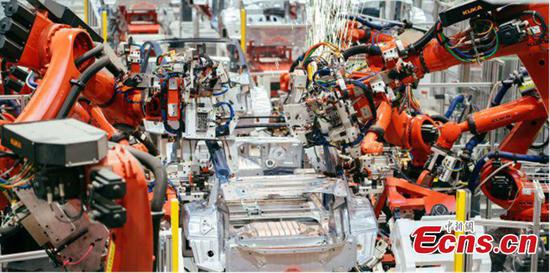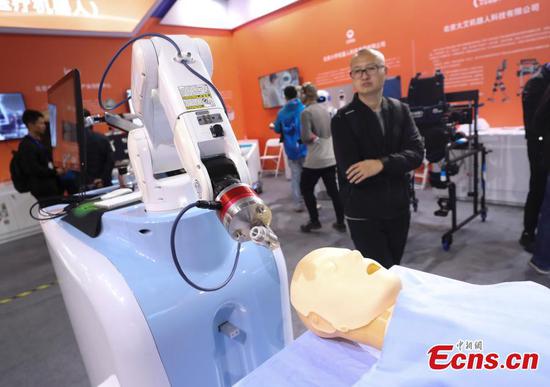
Visitors look at a Xiao-i robot during an industry expo in Shanghai. [Photo/China Daily]
Rising demand for artificial intelligence-powered chatbots with sentiment analysis is creating new growth opportunities for businesses in the area, experts said.
"An increasing number of businesses are asking for chatbots with more functions than just being conversation assistants. They want chatbots that have a better sense of empathy, are more interactive, and are able to transform consumer emotions into data and conduct sentiment analysis," said Xu Yiya, vice-president of Xiao-i Robot Technology Co Ltd, an AI customer service provider.
Xu said sentiment analysis can help chatbots better understand consumer needs.
Increasing demand for AI-powered chatbots with sentiment analysis is creating new business opportunities in the booming AI sentiment analysis market, which is estimated to see a 21 percent annual increase from 2019 to 2025, according to market analysis company QYReports, as business owners are worrying that customers may not be satisfied talking to emotionless chatbots. A report by Forbes shows that sales can drop as much as 80 percent when customers find their conversational partners to be less empathetic robots.
"Going forward, making chatbots more understanding of human emotions with sentiment analysis will have huge market potential across areas of healthcare, entertainment, sales, criminal investigation, and social work," said a report from Xiao-i.
Xu said enabling chatbots to be more emotionally intelligent and able to analyze sentiment has been a focus of Xiao-i Robot.
Earlier in August, the company's global standard for sentiment analysis was approved as a Draft Internet Standard during this year's meeting of ISO/IEC JTC 1/SC 35, an international organization for standardization.
"It was China's first global standard for sentiment analysis approved by an international committee. Our company is already on a fast track but we still have a long way to go in this area," Xu said.
Despite growing demand for AI-powered chatbots with sentiment analysis, Sun Maosong, a professor of computer science at Tsinghua University, said earlier its development still faces great challenges, such as those related to algorithms and data processing.
Sun said Tsinghua University has set up a few AI research centers to date, focusing on how to make AI products recognize and understand human emotions, such as its newly established trial class for AI studies earlier this year.
Making AI products aware of human emotions and sub-context information is also essential to a successful AI adaptation in the area of social science, art and literature, Sun said.


















































